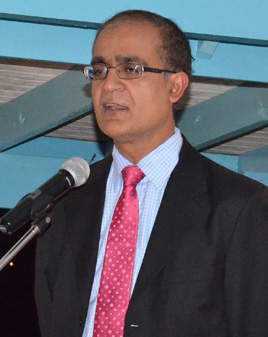|

|
 |
|
Last Updated: Feb 13, 2017 - 1:45:37 AM |

The Commonwealth Deputy Secretary-General Deodat Maharaj
|
The Commonwealth Deputy Secretary-General Deodat Maharaj, a Trinidadian, has written a strong opinion piece (below) calling for radical thinking and bold actions to address the issues of persisting low growth in the Caribbean. He is in Trinidad attending a UNDP forum on the issue.
The article highlights recommendations from the Commonwealth’s Caribbean Vision 2050 initiative, which is aimed at boosting the development prospects of countries in the region:
Stunning beauty, vibrant cultures and strong human capital are some of the defining characteristics of the Caribbean. And in the past decades, the region has seen encouraging progress in economic and social development in key areas such as education, health and private sector growth. Recent figures from the World Bank show a historically high number of reforms aimed at improving business environment, with 50 percent of economies in the region implementing policies to help local entrepreneurs.
But CARICOM countries are facing huge challenges. The small island nations are highly susceptible to external forces, with dire economic and social consequences. Back to back crises have reversed decades of development gains and left the Caribbean lagging behind other developing regions on growth. Since 2001, developing countries have seen real per capita growth rates that averaged around 4.31 percent per annum, but CARICOM nations only achieved an average 1.15 percent in the same period.
The Commonwealth has been working to boost the development prospects of Caribbean countries through strong measures such as our initiatives on Ocean Governance; debt management; development of export policies; and resilience building assessment tools to help countries agree on priority areas for policy intervention. We are also working at the global level to advance the interests of our small states, but we recognise that much more needs to be done.
Our latest innovation, the “Building the Resilience of Small States: A Strategic Vision for the Caribbean 2050” project, aimed at tackling the problem of slow growth, poses some tough questions to the region. Do current development strategies set the region on a path to achieve its sustainable development goals? What happens if we continue on our current policy path? And, is the region positioned to capitalise on its resources and new opportunities?
The findings of this research-based initiative, we hope, will be a wake-up call for governments and policy makers. What it makes clear is that business as usual is not an option. It is time for different thinking and a fresh approach to eradicating the persisting plague of arrested growth.
We need to address the challenges that affect economic stability, including trade disadvantages, threats to remittances, crippling debt, the effects of climate change and limited access to shock facilities and concessional finance due to International rules that do not take into account small states’ vulnerabilities. The diminished role of the private sector in driving economic development, the emigration of skilled labour forces and the resulting brain drain and limited innovation, and the worryingly high crime rates, all contribute in some way to stunted growth.
To overcome these hurdles, Caribbean leaders need to take strong and decisive actions. A creative and enterprising economy that encourages innovation is imperative and so is the full integration of youth into national development. The region should also focus on creating stable, safe, and prosperous societies and achieving environmental sustainability and a region built on clean, resilient energy systems that utilises local renewable resources. Taking stock of the region’s resources, such as those that lay in the ocean, is a must.
Ultimately, the Commonwealth recognises that behind the figures and percentages are the people whose lives we are committed to improving. The farmer struggling to find a viable market for his produce; the parent worried about how well the education system prepares their child to survive and excel in a modern world; the hospital patient desperate for treatment and the youths sitting on the block with dim futures, no employment prospects and whose frustration make them easy targets for criminal pursuits.
What is encouraging is that thought leaders in the region are cognisant of the need for urgent change. Caribbean heads of government and policy-makers, civil society and business leaders and academic experts will be meeting at the Forum on the Future of the Caribbean in Trinidad and Tobago, to confront the development challenges in the region. We in the Commonwealth believe there is potential for change and hope that the Forum will inspire new ideas and motivate action. For the region, the time for talk is over, the time to act is now.

© Copyright 2015 by thebahamasweekly.com
Top of Page
|
|
 |

|
